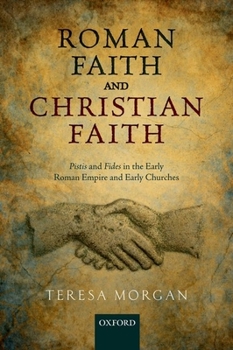Roman Faith and Christian Faith: Pistis and Fides in the Early Roman Empire and Early Churches
Select Format
Select Condition 
Book Overview
This study investigates why "faith" (pistis/fides) was so important to early Christians that the concept and praxis dominated the writings of the New Testament. It argues that such a study must be interdisciplinary, locating emerging Christianities in the social practices and mentalites of contemporary Judaism and the early Roman empire. This can, therefore, equally be read as a study of the operation of pistis/fides in the world of the early Roman principate, taking one small but relatively well-attested cult as a case study in how micro-societies within that world could treat it distinctively. Drawing on recent work in sociology and economics, the book traces the varying shapes taken by pistis/fides in Greek and Roman human and divine-human relationships: whom or what is represented as easy or difficult to trust or believe in; where pistis/fides is "deferred" and "reified" in practices such as oaths and proofs; how pistis/fides is related to fear, doubt and scepticism; and which foundations of pistis/fides are treated as more or less secure. The book then traces the evolution of representations of human and divine-human pistis in the Septuagint, before turning to pistis/pisteuein in New Testament writings and their role in the development of early Christologies (incorporating a new interpretation of pistis Christou) and ecclesiologies. It argues for the integration of the study of pistis/pisteuein with that of New Testament ethics. It explores the interiority of Graeco-Roman and early Christian pistis/fides. Finally, it discusses eschatological pistis and the shape of the divine-human community in the eschatological kingdom.
Format:Paperback
Language:English
ISBN:019880105X
ISBN13:9780198801054
Release Date:May 2017
Publisher:Oxford University Press
Length:640 Pages
Weight:2.10 lbs.
Dimensions:1.4" x 6.1" x 9.1"
Customer Reviews
0 rating





